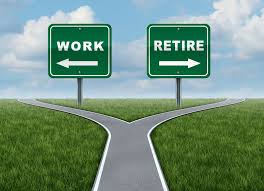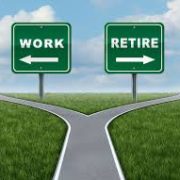Why Work Half of Our Life Expectancy? Maybe We Should Work All of It.

Recently, a Quora member posed the question: ” Why work half of our life expectancy?”
I wasn’t sure if he was suggesting that this is too short or too long of a time to work.
I suspect since work today is generally considered a “have to do” and not “a want to do” that he was coming down on it being too long a period to be involved in something many consider inconvenient, distasteful, uninspiring.
I’m sure it comes as no surprise that I answered coming down on the opposite side asking: “Why do we strive to only work half of our life expectancy? Why not nearly all of it?”
Over the last 50+ years, in most developed countries, we’ve injected this mindset that work is something to eventually avoid or reject in favor of the unnatural concept of “retirement.”
As such, we, of 20th-century origin, have operated with a model built around busting our humps for 40+ years (approximately half our current life expectancy) to be able to achieve that work avoidance – a period which may or may not get us to the average life expectancy.
Often that last 20-year journey is beset with physical and mental issues as a result of the stress and lifestyle habits from the previous 40.
The legacy retirement model that has become so entrenched in the psyche of western cultures fails to acknowledge that work is, and always has been, what we are designed to do.
We’ve strayed from that biological reality and ignored the role that meaningful work can have in health and length of life.
Consider the wise words of Wendell Berry, American novelist, poet, essayist, environmental activist, cultural critic, and farmer as he reflects on the prevailing attitude toward work.
“We can say without exaggeration that the present national ambition of the United States is unemployment. People live for quitting time, for weekends, for vacations, and for retirement; moreover, this ambition seems to be classless, as true in the executive suites as on the assembly lines. One works not because the work is necessary, valuable, useful to a desirable end, or because one loves to do it, but only to be able to quit – a condition that a saner time would regard as infernal, a condemnation.”
Work has long been recognized as a critical component of longevity. A study of 83,000 Americans 65 and older found that being retired or unemployed was associated with a greater risk of poor health.
Our chances of remaining healthy increase if we continue working.
Here’s the rub.
Many of us commit to work that is outside of our true talents and essence and choose the paycheck over being aligned with what we are best designed to do and what truly inspires and energizes us.
As such, work, which can provide us with structure, meaning, connection, and inspiration, often becomes drudgery and a “necessary evil.”
So, we squeeze it into 40 years to reach the opportunity to exist another 20 years in non-work heaven.
It’s an 80-year mindset when, in fact, we have biology that should easily get us to 100 or beyond.
In fact, worldwide research on the lives of centenarians reveals that most continued to work very late in life.
I spoke to this in a previous article:
Semi-retirement for a lifetime.
There’s an interesting trend forming that we should be paying attention to that speaks to the realization that busting the hump for forty years to reach an unpredictable retirement doesn’t make sense.
And it’s coming from the millennials and GenXers.
More and more are committing, in their 30s, to aligning their work with their core talents, what they do best, and what inspires them and to doing that as long as they are able.
Rather than sell out to building someone else’s dream, they are pursuing their own with no designs on a retired life.
It’s a lifestyle built around the concept of semi-retirement for a lifetime.
Rocco Pendola is writing about this on Medium. Here’s a link to a couple of his articles that speak to this concept.
There’s a Movement Forming to a Different Way of Living Life
https://themakingofamillionaire.com/exactly-what-it-means-to-be-semi-retired-e8502292d3e9
What are your thoughts on this topic? Tell us how you feel – leave a comment below. Thanks for reading!





Leave a Reply
Want to join the discussion?Feel free to contribute!